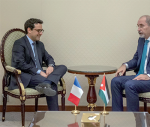You are here
Why not on foes?
Jun 29,2015 - Last updated at Jun 29,2015
US President Barack Obama’s recent phone call to French President Francois Hollande pledging to end American intelligence services spying on him may calm French anger and disappointment that one of its closest allies spied on it, but will not end the debate about spying among declared allies.
A White House statement released after the phone call, however, was quite vaguely worded, failing to clarify whether the National Security Agency was still bugging the conversations and e-mails of other French diplomats and officials.
Obama reiterated that the US had abided by the commitment it made to two other French presidents over the last 10 years, namely Jacques Chirac and Nicolas Sarkozy.
Obviously not.
The US statement reaffirmed commitment “to our productive and indispensable intelligence relationship with France, which allows us to make progress against shared threats, including international terrorism and proliferation, among others”, but Hollande said it was unacceptable that the US should have spied on three successive French presidents.
A French government spokesman said “we find it hard to understand or imagine what motivates an ally to spy on allies who are often on the same strategic positions in world affairs”.
It had been revealed that the US intelligence agency was also caught spying on German Chancellor Angela Merkel; there should be no surprise to know that other world leaders, close US allies at that, are being snooped on.
Seeing that threats abound from many other quarters, one wonders why the US would spend precious funds, time and employees to spy on friends — of this calibre, for that matter.
It is, undoubtedly, a practice as old as the first organised systems of governance. But while spying on enemies, or even industrial spying, is a notion one could understand, the US’ systematic spying of allies is befuddling.
It might consider diverting all this effort to another direction. Local and international terrorists, for example.
That said, diplomats, people of high visibility in the public sphere in general, should know that they are potential targets. All it takes is precautionary measures, because spying is there to stay, no doubt.













